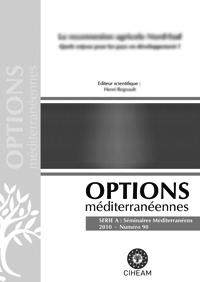| Article précédent | p. 51-54 | Article suivant |
Effect of tillage on short-term CO2 emissions from a loam soil in semiarid Aragon (NE Spain)
Adoption of conservation tillage in rainfed agricultural systems can reduce soil CO2 emissions to the atmosphere thus minimizing soil organic carbon losses and mitigating the greenhouse effect. In this study we evaluate the influence of conventional and conservation tillage (reduced tillage and no-tillage) systems on short-term CO2 fluxes from a loam soil under both continuous cropping and cereal-fallow rotation. The study has been conducted as part of a long-term conservation tillage experiment established in 1989 in semiarid Central Aragón (NE Spain). CO2 emissions measured just after primary tillage operations were greater under continuous cropping than under cereal-fallow rotation. For both cropping systems, CO2 fluxes were significantly higher under conventional tillage than under reduced tillage and no-tillage. First results indicate that conservation tillage can reduce CO2 fluxes from semiarid soils in Aragón.
- [ Afficher ]
- [ Télécharger ]
- [ Exporter la citation ]
Vous pouvez télécharger la citation au format :
- [ Imprimer ]
-
Mots-clés
AGRICULTURE PLUVIALE, DIOXYDE DE CARBONE, SOL, TRAVAIL DU SOL CONVENTIONNEL, TRAVAIL DU SOL DE CONSERVATIONCiter cet article
Alvaro J., López M.V., Gracia R., Arrúe J.L. Effect of tillage on short-term CO2 emissions from a loam soil in semiarid Aragon (NE Spain). In : Cantero-Martínez C. (ed.), Gabiña D. (ed.). Mediterranean rainfed agriculture: Strategies for sustainability . Zaragoza : CIHEAM, 2004. p. 51-54. (Options Méditerranéennes : Série A. Séminaires Méditerranéens; n. 60). Final Seminar of the Regional Action Programme on Rainfed Agriculture (RAP-RAG), 2003/06/02-03, Zaragoza (Spain). http://om.ciheam.org/om/pdf/a60/04600044.pdf



